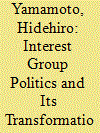| Srl | Item |
| 1 |
ID:
191593


|
|
|
|
|
| Summary/Abstract |
In Japan, lags behind both developed and developing countries in women’s political participation, the number of female assembly members is rising. However, it is unclear whether this increase has led to the adoption of more women-friendly policies. Therefore, this study empirically investigates the association between the two, focusing on local municipalities. We conducted a questionnaire survey of municipalities nationwide and found that more policies related to work–life balance were adopted when there were female assembly members than when there were not. And where more than 25% of the assembly members were women, policies on social and political participation and support for the socially vulnerable were stronger. Thus we find that in Japan’s municipal assemblies a higher proportion of female members makes the introduction of women-friendly policies more likely.
|
|
|
|
|
|
|
|
|
|
|
|
|
|
|
|
| 2 |
ID:
179275


|
|
|
|
|
| Summary/Abstract |
The political reforms that have been going on since the 1990s have drastically changed the face of politics in Japan. The most significant of these reforms was the change of government, which brought an end, albeit only once, to the long-standing Liberal Democratic Party (LDP) regime. These changes were expected to change the power structure by altering the contact of interest groups with political elites. I examine this issue based on a longitudinal survey conducted in four rounds between 1997 and 2017.
The results show a robust structure of interest group politics, although the features were weakening. That is, contacts with the LDP and the bureaucracy were sources of political influence for interest groups. The impact of the two-party system and its setbacks are seen in the change in contact with the Democratic Party of Japan (DPJ). However, The DPJ did not function as a source of interest representation.
|
|
|
|
|
|
|
|
|
|
|
|
|
|
|
|